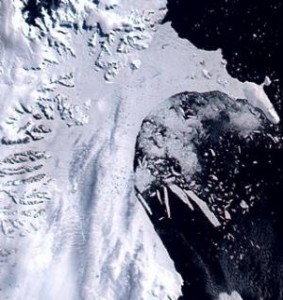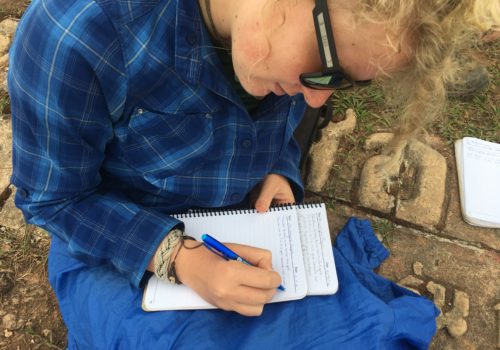
Larson B Ice Shelf collapse in 2002. (Science Daily, Oct. 16, 2006)
An important conference, Climate Change: Global Risks, Challenges and Decisions just concluded in Copenhagen (March 10-12), focusing on climate change and updating the most current thinking on what is going to happen. Some other related reports and information just came out as well that are worth highlighting.
The news is not good.
Consistently as I’ve been reading and studying climate change over the last few years, it seems that the worst case scenarios are usually what happens, or in some cases are underestimates of what ends up actually happening—from open water at the North Pole to rates of glacier melt to extinction rates among vulnerable populations. Maddeningly we’ve already lost 8 years of the United States doing nothing, and actively undermining the science and confusing the issue. We don’t have much time left to make some radical changes.
Here are some recent headlines and a few quotes of note:
Sea levels to surge at least a metre by 2100, scientists warn at Copenhagen meeting (Grist, March 10)
“A few years ago, those of us who talked about the impact of the ice sheets were seen as extremists. Today it is recognized as the central issue,” said glaciologist Eric Rignot of the University of California at Irvine.
“The world has very little time,” IPCC chief Rajendra Pachauri told the meeting after the new findings were presented.
Carbon cuts ‘only give 50/50 chance of saving planet (The Independent, March 9)
The key aim of holding the expected increase to 2C, beyond which damage to the natural world and to human society is likely to be catastrophic, is far from assured, the research suggests, even if all countries engage forthwith in a radical and enormous crash programme to slash greenhouse gas emissions – something which itself is by no means guaranteed.
If action is sluggish or non-existent, the model suggests that climate change is likely to cause almost unthinkable damage to the world; under a “business-as-usual” scenario, with no action taken at all and emissions increasing by more than 100 per cent by 2050, the end-of-the-century rise in global average temperatures is likely to be 5.5C, with a worst-case outcome of 7.1C – which would make much of life on earth impossible. “Even with drastic cuts in emissions in the next 10 years, our results project that there will only be a 50 per cent chance of keeping global temperatures rises below 2C,” said Dr Vicky Pope, the Met Office’s Head of Climate Change Advice.
Global temperatures ‘will rise 6C this century’ (Times Online, March 10)
“There is not a lot, if any, good news,” said Richardson of the emerging science. “What we know now is that we are we facing the worst case scenario.”
The warnings on temperature rise are linked to the surge in greenhouse gas emissions over the last decade. Currently humanity generates the equivalent of about 50 billion tonnes of CO2 a year through burning fossil fuels, agriculture, deforestation and other processes.
In its last report the IPCC made over-cautious assumptions about how these emissions would rise in future – and concluded it would be possible to prevent a total global temperature rise of more than 2C compared with pre-industrial times.
… John Ashton, a senior civil servant at the British Foreign Office, launched a startling attack – for a government official – on the ability of politicians to deal with climate change, or even understand it.
He said he believed politicians had still failed to grasp the seriousness of climate change – or were even prepared to bend scientific findings to purely political ends.
“Policymaking is not adapted to deal with the problem of climate change, ” said Ashton. “Politiicans often see science as just another group and that opinions based on science are just another lobby. There are also plenty of people who due to ignorance or mischief are willing to confuse the issue.”
Why the world’s top scientists underestimated how fast we’re destroying the climate (Climate Progress, March 16)
The overly optimistic predictions in the IPCC’s Fourth Assessment, released in 2007, appear to have been driven, in part, by the political dynamics involved in the international effort.
“We’re looking at future climate beyond anything we’ve considered,” Chris Field, director of the global ecology department at the Carnegie Institution for Science, told the American Association for the Advancement of Science (AAAS) annual meeting in Chicago last month. “Actual emissions are at or above the total range of possibilities considered in the IPCC’s Fourth Assessment.”
“We were too optimistic,” Field said. “There was no decrease in emissions from developed countries and the sharpest increases and overall intensity came from China and India that rely heavily on coal.”



